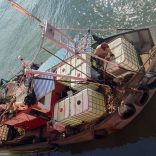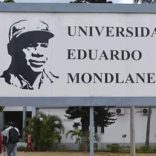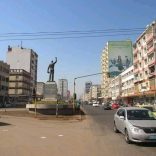Mozambique: Leader of alleged "Naparamas" arrested
Cabo Delgado insurgency grows amid Rwandan and SADC deployment – DefenceWeb

A Botswana Defence Force C-130 Hercules in Mozambique.
The conflict in the Cabo Delgado province of Mozambique has led to over 3 000 deaths, displaced just under a million people and is showing no signs of slowing down. If anything, Ansar al-Sunna (known locally as al-Shabab), the mostly local terrorist group responsible for the conflict, are growing in capacity and numbers.
The Mozambican government has been criticized by academics, politicians, security experts and journalists for their inability to thwart an initially small group of violent, desperately poor locals and address the under-lying socio-economic factors that fuel this insurgency. Ansar al-Sunna’s proliferation since it formed in 2017 and their increasing capabilities have not gone unnoticed by external politicians and the wider international community. Rwanda, for reasons speculated to be political, has sent 1 000 soldiers and police to conduct security and combat operations in the northern province. The Southern African Development Community (SADC) will send a standby force at an unknown date. South African Special Forces arrived in Pemba on Monday as part of the SADC force, along with members of the Botswana Defence Force.
The advance team is not expected to be immediately involved in direct combat operations against al-Sunna. Their main mission is to gather intelligence, conduct reconnaissance, advise the Mozambican military, and prepare command and control structures for a potential deployment of the full SADC brigade, notes African Defence Review director Darren Olivier. Up to 3 000 SADC personnel may be deployed if deemed necessary.
Security studies expert Jasmine Opperman, who has been analysing the conflict since day one, said it looks like the SADC multinational deployment will not be possible and instead, a much smaller SADC deployment is likely, but where and when they will be deployed is still up for speculation. Opperman adds that the Rwandan forces are primarily offensive and have moved into Mueda (offensive position) and Afungi (defensive position) in Cabo Delgado and that a force of 1 000 soldiers are not going to be able to cover such a big province.
Opperman maintained there are one of two reasons for the Rwandan deployment to Mozambique, the first being direction from French influence, adding, “We still have to answer who is going to pay that budget [for the Rwandan deployment] and I do believe France and Total will play a significant role.” The second reason is Rwanda has been a region of great instability and with it being a minority rule, President Paul Kagame could be utilizing this opportunity for power projection, silencing criticism and strengthening his position. Opperman said the small number of 1 000 soldiers alludes to Kagame’s main concern being domestic. “This is not the DRC, this is not Uganda, Cabo Delgado is a different ball game. Looking at how the insurgents have developed…the weapons they have gained, the vehicles they gained in Palma,” said Opperman, adding the Ansar Al-Sunna insurgents could likely have a force of close to 3 000 insurgents spread across Cabo Delgado.
Since the attack on Palma, about 470 dhows, documented by Opperman’s sources, have entered Mocimboa da praia, some from Tanzania, Madagascar, and other surrounding regions. Under-reporting in Cabo Delgado remains a huge problem for accurate intelligence gathering for the conflict.
Many experts and academics, including Opperman, maintain that the narrative around the conflict is controlled by Mozambican president Filipe Nyusi’s government. “The amount of weapons taken from these garrisons [Mozambique Armed Defense Forces/FADM] has already put them [insurgents] in a much stronger position,” added Opperman. Movability and insurgents’ financial position can be assessed but weapons and equipment, which has increased, cannot be accurately measured. This month alone, Opperman’s sources have confirmed 65 security incidents in Cabo Delgado which is in huge contrast to what is being reported by Mozambique’s press and other relevant media outlets.
From an intelligence perspective, Nyusi and FADM either have the correct information to inform SADC and Rwandan troops and are hiding it from the public or they only have an ill-conceived picture of what is happening in the insurgent-torn region. If the latter is true and SADC and Rwandan troops are guided by this intelligence, they could very well find themselves in compromising situations.
Opperman further criticized the defensive position that FADM has taken up in Afungi, saying it is up for debate whether controlling Afungi is on their list of priorities. Oil plants in the region are a more likely target for insurgents seeking to control the region.
“Most of the incidents now taking place are pushing down into Muidumbe, into Mueda and Macomia. Those three areas are red hot at this point in time,” said Opperman, adding Niassa is the next province to keep a close eye on, with reports coming in that there is already a recruitment drive taking place in the province.
Opperman believes command and control of the SADC force will be led by Mozambique and the effects of political games being played through intelligence and command and control is yet to be seen.
Experts are reporting that the insurgency has grown in numbers, equipment, and capability. What started out as a local revolt due to mass poverty and discontent with government services has turned into a threat to the national security of the southern African region. A capable Rwandan defence force and SADC force is not predicted to make the same mistakes as FADM made, which led to the insurgents’ proliferation. Underestimating how well informed and spread out the insurgency is is not a mistake external forces should make. A final observation from Opperman was that the insurgency is showing signs of developing into a more classical idea of terrorism, aligned with Islamic State. With that, and as external forces push the insurgency underground, classic tactics such as improvised explosive devices may become common.
Rwanda and SADC summits have yet to address the underlying issues that fuel the insurgency. The Mozambican government has yet to do so either. A solely security response will, at least according to journalists, security experts, politicians and academics, not solve the extremely violent civil unrest in Cabo Delgado.













Leave a Reply
Be the First to Comment!
You must be logged in to post a comment.
You must be logged in to post a comment.